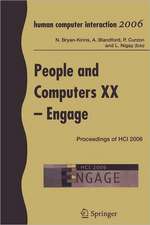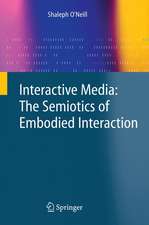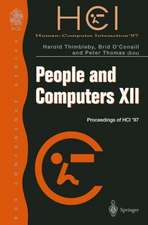Orchestrating Human-Centered Design
Autor Guy Boyen Limba Engleză Paperback – 9 noi 2014
Orchestrating Human-Centered Design results from incremental syntheses of courses the author has given at the Florida Institute of Technology in the HCD PhD program. It is focused on technological and philosophical concepts that high-level managers, technicians and all those interested in the design of artifacts should consider. Our growing software -intensive world imposes better knowledge on cognitive engineering, life-critical systems, complexity analysis, organizational design and management, modeling and simulation, and advanced interaction media, and this well-constructed and informative book provides a road map for this.
| Toate formatele și edițiile | Preț | Express |
|---|---|---|
| Paperback (1) | 329.11 lei 6-8 săpt. | |
| SPRINGER LONDON – 9 noi 2014 | 329.11 lei 6-8 săpt. | |
| Hardback (1) | 333.72 lei 6-8 săpt. | |
| SPRINGER LONDON – 5 oct 2012 | 333.72 lei 6-8 săpt. |
Preț: 329.11 lei
Preț vechi: 411.39 lei
-20% Nou
Puncte Express: 494
Preț estimativ în valută:
62.99€ • 65.51$ • 52.79£
62.99€ • 65.51$ • 52.79£
Carte tipărită la comandă
Livrare economică 13-27 martie
Preluare comenzi: 021 569.72.76
Specificații
ISBN-13: 9781447161967
ISBN-10: 1447161963
Pagini: 228
Ilustrații: XVI, 212 p.
Dimensiuni: 155 x 235 x 12 mm
Greutate: 0.33 kg
Ediția:2013
Editura: SPRINGER LONDON
Colecția Springer
Locul publicării:London, United Kingdom
ISBN-10: 1447161963
Pagini: 228
Ilustrații: XVI, 212 p.
Dimensiuni: 155 x 235 x 12 mm
Greutate: 0.33 kg
Ediția:2013
Editura: SPRINGER LONDON
Colecția Springer
Locul publicării:London, United Kingdom
Public țintă
GraduateCuprins
Preface.- List of Abbreviations.- Introduction.- The Orchestra Model.- Cognitive Engineering.- Life-Critical Systems.- The Making of Complex Systems.- Organization Design and Management.- Modeling and Simulation.- Advanced Interaction Media.- Conclusion.- Subject Index.
Recenzii
“For academics who deal with humans in systems concerns, the book is rich in references and theory of design processes. … this book is also targeted at corporate chief technology officers, program chief engineers, and systems engineering managers … . For INCOSE members, the book should be required reading for the Human Systems Working Group. It will also be of interest to the Complex Systems Working Group, the System Science Working Group, and the System of Systems Working Group.” (Lawrence D. Pohlmann, Insight, Vol. 16 (2), July, 2013)
Notă biografică
Dr. Guy André Boy is a University Professor at Florida Institute of Technology (FIT) where he is also the Director of the Human-Centered Design Institute (HCDi), Chief Scientist for Human-Centered Design at NASA Kennedy Space Center, Senior Research Scientist of the Florida Institute for Human and Machine Cognition (IHMC). Fellow of the Air and Space Academy, Former President and CEO of the European Institute of Cognitive Sciences and Engineering (EURISCO International) and Co-Founder of the Ecole Nationale Supérieure de Cognitique (Institut de Cognitique), Bordeaux, France. Involved in the development of human-centered design (HCD) and cognitive engineering for more than 30 years, he worked in both research and industry with major companies (including aerospace, automobile, defense, telecommunication, energy and software), large public organizations, and international bodies, to advise on both strategic and operational issues related to life-critical systems, risk management, advanced automation, human-computer interaction, artificial intelligence and knowledge management.
Textul de pe ultima copertă
The time has come to move into a more humanistic approach of technology and to understand where our world is moving to in the early twenty-first century. The design and development of our future products needs to be orchestrated, whether they be conceptual, technical or organizational. Orchestrating Human-Centered Design presents an Orchestra model that attempts to articulate technology, organizations and people. Human-centered design (HCD) should not be limited to local/short-term/linear engineering, but actively focus on global/long-term/non-linear design, and constantly identify emergent properties from the use of artifacts.
Orchestrating Human-Centered Design results from incremental syntheses of courses the author has given at the Florida Institute of Technology in the HCD PhD program. It is focused on technological and philosophical concepts that high-level managers, technicians and all those interested in the design of artifacts should consider. Our growing software -intensive world imposes better knowledge on cognitive engineering, life-critical systems, complexity analysis, organizational design and management, modeling and simulation, and advanced interaction media, and this well-constructed and informative book provides a road map for this.
Orchestrating Human-Centered Design results from incremental syntheses of courses the author has given at the Florida Institute of Technology in the HCD PhD program. It is focused on technological and philosophical concepts that high-level managers, technicians and all those interested in the design of artifacts should consider. Our growing software -intensive world imposes better knowledge on cognitive engineering, life-critical systems, complexity analysis, organizational design and management, modeling and simulation, and advanced interaction media, and this well-constructed and informative book provides a road map for this.
Caracteristici
Guy André Boy has over 30 years experience in the field of human-centered design Contains reflections and real-world examples from practice in both industry and academia Human-centered design is a necessary approach to modern engineering design




























